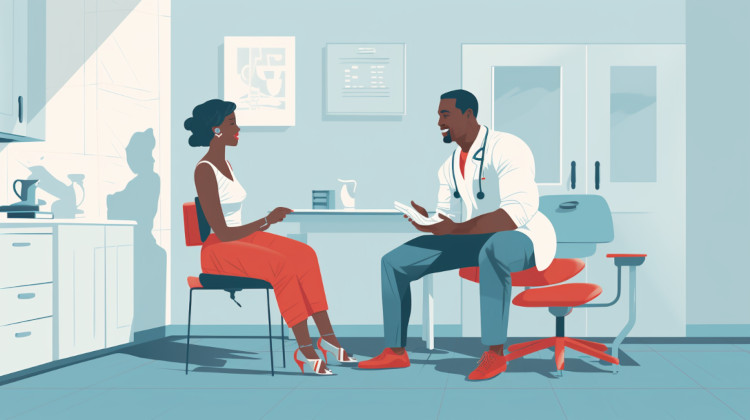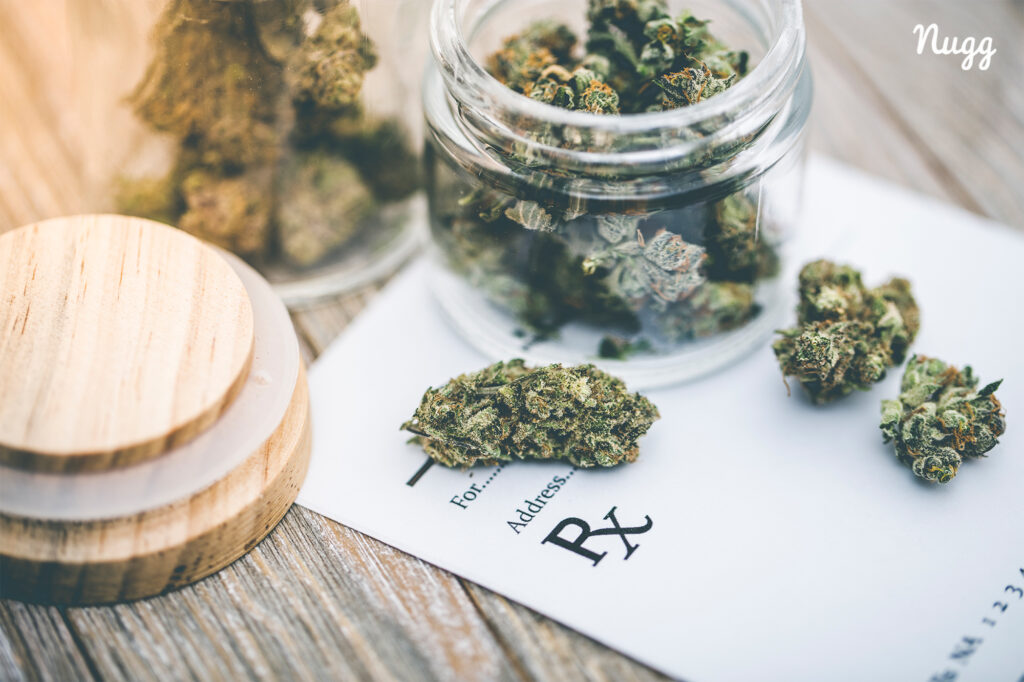
Obsessive-compulsive disorder (OCD) is a psychological disorder characterized by intrusive, reoccurring thoughts and behaviors that can lead to the point of obsession. The condition can range from mild minimal intrusions to severe habits that impede daily life.
In the United States, OCD affects approximately 2.5 million adults, and the exact cause of it remains unclear. Treatment for each patient varies drastically and can include a mixture of talk therapy and prescription medication.
Cannabis has been studied for alternative treatments for other physical and mental health conditions, including OCD.1 The relationship between OCD and cannabis can be complex. However, there are reasons why cannabis shows promise in relieving OCD symptoms, and there is definitely cause to explore further.
What is Obsessive-Compulsive Disorder (OCD)?
Obsessive-compulsive disorder is a mental health condition characterized by compulsive intrusive thoughts. Patients turn to particular behaviors to seek relief from the anxiety their condition can cause them. These ritualistic compulsions generally only offer temporary relief, leading to an endless cycle that can cause disruptions in day-to-day life.
It is understood that OCD arises in people for diverse reasons, and several factors are in play.
Research indicates that there is a genetic component in at least some cases of OCD, with children of parents who suffer from the condition being much more likely to develop it themselves.2
It’s also thought that there can be a biological component where an individual’s body chemistry can play a role in developing the disorder. Research on the brain structure of OCD patients has shown abnormalities in some patients.
OCD can also be learned. Evidence indicates that childhood trauma or stressful situations can bring on OCD. It’s even thought that children can learn the behavior from their parents.
Risk factors for OCD include:
- A genetic predisposition
- Body chemistry or possible illness during childhood
- Abnormal development of brain structure
- Anxiety
- Childhood trauma
- Learned behavior
Signs & Symptoms of OCD
Symptoms of OCD are separated into obsessive symptoms and compulsive symptoms. Most people experiencing OCD will have a mix of each category.
Obsessive symptoms include:
- Fear of contamination, usually by germs or dirt
- Excessive doubt and difficulty dealing with uncertainty
- Unwanted or taboo thoughts about topics like religion, sex, and violence
- Aggressive thoughts about harm towards the self or others
- Requiring things to be ordered, patterned, or symmetrical
Compulsive symptoms include:
- Excessive washing and cleaning
- Repeatedly checking things like doors and stoves
- Counting
- Repeating a particular phrase or prayer
- Excessive orderliness
- Constantly seeking reassurance
- Keeping to a strict routine
Not all routines and rituals are signs of OCD. If someone likes to keep a neat house, they may just want a tidy environment. When these behaviors become overwhelming and occupy large portions of the day, they may be cause for concern.
How is OCD Typically Treated?
The standard treatment method for OCD includes talk therapy and, if deemed necessary, prescription medication. The specific duration and intensity of these methods will depend on the individual and the severity of the condition.
Talk therapy, or psychotherapy, is a broad term that includes several techniques to treat a person's emotions, thoughts, and behaviors. Cognitive behavioral therapy is the specific treatment for OCD that involves a person talking and working with a therapist to face compulsive fears and habits.
Patients with OCD who require medication are usually prescribed selective serotonin reuptake inhibitors (SSRIs). These types of drugs increase the amount of serotonin in the brain. These medications can be beneficial but require an individual to take the medicine regularly for at least several weeks to take full effect.
Adverse side effects are possible when taking SSRIs and include:
- Irritation or change in mood
- Shakiness or a feeling of anxiety
- Feeling or being sick
- Diarrhea or constipation
- Dizziness
- Sleeping issues or insomnia
- Headaches
- Changes to libido
More severe adverse effects include self-harm or suicidal thoughts. Contact a medical professional immediately if you experience these symptoms. self-harm or suicidal thoughts. Contact a medical professional immediately if you experience these symptoms.
Can Cannabis Help Alleviate OCD Symptoms?

The underlying mechanisms behind OCD largely remain a mystery, and the condition may have unique causes (or multiple causes) depending on the individual. Because of this, there isn’t much professional insight into the relationship between weed and OCD.
One of the most apparent ways cannabis may help relieve OCD symptoms is through its anti-anxiety properties.3 CBD and THC are the two most prominent cannabinoids found in the plant and have been shown to modulate and, depending on the dosage, potentially diminish anxiety symptoms.4
A growing body of evidence also suggests that the body’s endocannabinoid system plays a role in OCD and the development of habits.5 Multiple studies on individuals with OCD, both by itself and paired with other common psychological conditions, have found that participants report a significant reduction in OCD symptoms with cannabis. They also show decreased OCD episodes when cannabis is paired with psychological therapy.
Additional research has linked the body’s endocannabinoid system to regulating both anxiety and habitual behavior, strongly suggesting that the ECS plays a role in OCD. The research also cites several instances where cannabis was used to treat OCD symptoms. In each case, the participant found at least a 50% reduction in symptoms.6
Despite the murky relationship between OCD and weed, patient feedback seems to suggest that the combination may have benefits that remain unclear to medical professionals. A survey of over 500 people with OCD found that 90% use cannabis to relieve symptoms of their condition. Some patients did experience an increase in their symptoms.7
While it’s not entirely clear what causes OCD, there is growing evidence that the endocannabinoid system is involved in the disorder and that cannabis may help regulate it. Before exploring adult use or medical cannabis and OCD further, consult with your doctor to ensure your safety.
Can CBD Help with OCD?
CBD is a popular cannabinoid that may help ease the symptoms of various ailments because it has properties similar to THC without the intense, intoxicating effects – especially when consumed in an isolated form. It is also more widely available to the public due to its federally legal status, so many people wonder if CBD helps with OCD.
The research regarding CBD and OCD is limited. However, CBD is known for its potential anti-anxiety properties and potential to help treat depression. Both of these factors may be helpful for OCD patients.
It’s important to remember that cannabis affects everyone differently and may interact with other medications causing adverse side effects. Consult a doctor before using cannabis for your OCD and its symptoms.
Are There Any Risks or Side Effects When Using Weed to Treat OCD?
It is not yet clearly understood if cannabis is an effective treatment for OCD. Some patients experience a reduction in their symptoms when including medical cannabis in their OCD treatment, while others have an increase.
Beyond just the effects of cannabis on the mind and body, if a patient takes an SSRI medication to treat their condition, there is a potential risk of developing complications like serotonin syndrome.
Serotonin syndrome is a condition that can develop when there is a dramatic increase in serotonin levels in the body and leads to adverse effects like rapid heart rate, headache, and diarrhea.
Speak with your doctor before making a decision regarding your OCD diagnosis and medical marijuana usage.
Is OCD Considered a Qualifying Condition?
Medical marijuana and OCD may be a more likely duo in states where the disorder is a qualifying condition to obtain an MMJ card or where recreational cannabis is legal. States like Florida and Ohio explicitly include obsessive-compulsive disorder on their list of qualifying conditions to be approved for a medical cannabis card.
If OCD is not a qualifying condition in your state, other illnesses associated with the disorder, like anxiety or depression, may be listed. You can seek an evaluation with a qualified medical marijuana doctor to register for your state’s medical marijuana program.
How NuggMD Can Help

NuggMD is the nation's leading medical marijuana technology platform, serving patients in 25 states and growing. We’ve connected over 1,000,000 patients with their new medical marijuana doctors face-to-face via our state-of-the-art telemedicine platform.
We believe that every human being has the right to explore the benefits of medical cannabis and are fully committed to helping each patient explore all of their options in their journey to wellness. For further information on whether you qualify for medical cannabis, select your state.
Resources
- Mauzay D, LaFrance EM, Cuttler C. Acute Effects of Cannabis on Symptoms of Obsessive-Compulsive Disorder. Journal of Affective Disorders. 2020. doi:https://doi.org/10.1016/j.jad.2020.09.124 ↩︎
- Nestadt G, Grados M, Samuels JF. Genetics of obsessive-compulsive disorder. Psychiatr Clin North Am. 2010;33(1):141-158. doi:10.1016/j.psc.2009.11.001
↩︎ - Ferber SG, Namdar D, Hen-Shoval D, et al. The “Entourage Effect”: Terpenes Coupled with Cannabinoids for the Treatment of Mood Disorders and Anxiety Disorders. Current Neuropharmacology. 2020;18(2):87-96. doi:https://doi.org/10.2174/1570159x17666190903103923 ↩︎
- Sharpe L, Sinclair J, Kramer A, de Manincor M, Sarris J. Cannabis, a cause for anxiety? A critical appraisal of the anxiogenic and anxiolytic properties. J Transl Med. 2020;18(1):374. Published 2020 Oct 2. doi:10.1186/s12967-020-02518-2 ↩︎
- Szejko N, Fremer C, Müller-Vahl KR. Cannabis Improves Obsessive-Compulsive Disorder—Case Report and Review of the Literature. Frontiers in Psychiatry. 2020;11. doi:https://doi.org/10.3389/fpsyt.2020.00681 ↩︎
- Kayser RR, Snorrason I, Haney M, Lee FS, Simpson HB. The Endocannabinoid System: A New Treatment Target for Obsessive Compulsive Disorder? Cannabis and Cannabinoid Research. 2019;4(2):77-87. doi:https://doi.org/10.1089/can.2018.0049 ↩︎
- Kayser RR, Senter MS, Tobet R, Raskin M, Patel S, Simpson HB. Patterns of cannabis use among individuals with obsessive-compulsive disorder: Results from an internet survey. Journal of Obsessive-Compulsive and Related Disorders. 2021;30:100664. doi:https://doi.org/10.1016/j.jocrd.2021.100664 ↩︎
The information in this article and any included images or charts are for educational purposes only. This information is neither a substitute for, nor does it replace, professional legal advice or medical advice, diagnosis, or treatment. If you have any concerns or questions about laws, regulations, or your health, you should always consult with an attorney, physician or other licensed professional.

